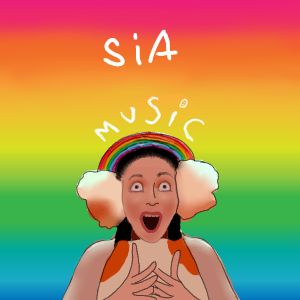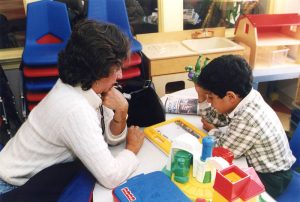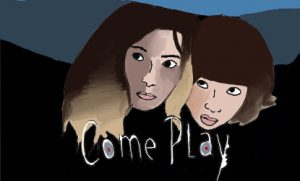- Arts and Entertainment: Best of 2020-21
- Best of SNO
- Issue 6: Opinions 2020-21
- Opinion
- SUMMER OVERHAUL 2020-21
- Ω Issue 6: 2020-21
Sia’s directorial debut “Music” pains me: the perspective of someone with a sibling on the autistic spectrum

Pop star Sia made her directorial debut with the film “Music” on Feb. 10. The film explores the themes of finding a voice and creating a family with autistic representation. Or at least, that was the goal. Unfortunately, it fell short.
March 24, 2021
Pop star Sia made her directorial debut with the film “Music” on Feb. 10, casting former Dance Moms star Maddie Ziegler to play a girl on the autism spectrum, named Music, and actress Kate Hudson to play her newly-sober half-sister Zu. The plotline looks solid on paper; Music’s primary caretaker, her grandmother, passes away unexpectedly and Zu becomes Music’s sole guardian, exploring the themes of finding a voice and creating a family. Or at least, that was the goal. Unfortunately, it fell short, and it broke my heart.
I can’t speak for someone with autism— I don’t have autism. However, I have grown up around the world of developmental disabilities: applied behavioral analysis (ABA) therapy sessions, token boards scattered on the floor, the sound of the (expensive) assistive speaking app Proloquo2Go, absorbing terms such as “stimming” and “positive reinforcement” down the hallway while my best friend and I were hanging out in my room in elementary school.
This is my normal, it always has been. My younger brother, who has autism, has taught me so many things without words. Every little word, every little “I love you,” every little hug, meant the world. I began to teach my peers what autism was, what other developmental disabilities existed, why it’s important to play with new people at recess— it was just all instinctual.
Fourth-grade me aspired to be an ABA therapist (until I realized that I lack the patience and my passions are better used elsewhere). Every piece of media, book, film, anything, that had a sibling on the spectrum captured my heart. The Netflix series “Atypical” warmed my heart and brought me to tears on many occasions. Sometimes I just wanted to reach out and hug the characters (not to mention, there was also beautiful queer representation). I was hoping a film by someone with influence, like Sia, would be more helpful than harmful. Instead, I felt my heart wince with immense pain at every waking moment of the film.
“Music” portrays an utter disregard for people on the spectrum. After all, Rotten Tomatoes did give this film a 9% rating on the Tomatometer. The critic consensus emphasizes how “Music” is “offensive in its depiction of autism — and painfully misguided in essentially every respect — ‘Music’ is a vanity project that begs to be turned down.” When watching films, I try to separate myself from it’s ratings. I tried that for this movie; I ended up abruptly shutting down my computer, then angrily writing everything that was wrong with “Music.” I could not find myself disagreeing with the critic’s opinions.
Poor research and planning; painful mockery
In response to the outcry over a neurotypical actor playing Music, Hudson clapped back saying it sparked “important dialogue” around the autism community. But how could she say anything but that? She was nominated for a Golden Globe for her role in “Music,” she obviously won’t say anything negative.
Here’s how the film starts: Music is hitting herself, then the opening dance number blares with flashy colors and lights with the lyrics “my imagination sets my spirit free.” Her facial expressions are over-exaggerated, and almost terrifying because you know none of this is realistic. It was jarring to watch. The only word to describe how I feel: yucky. I was reminded of people at school who shove people aside because they are different, anger boiling inside me. It brought back memories of people passing judgemental side glares during 6th grade P.E. at someone on the spectrum when all they needed was someone to understand them, or at least try to.
Ziegler had to be taught how to “act autistic,” (she isn’t to blame, it’s been widely reported that Zieglar didn’t have much choice in opting out because of her relation to Sia). Paige Layle, a Youtuber with autism, expressed her take on Sia’s film exclaiming how you can’t act “autistic” and call it acting, adding on how every person on the spectrum acts differently; “even me acting like [Music was] would be wrong…this is the way I was bullied.”
The amount of mockery—it’s just gross. Every time a dance number came on, I rolled my eyes. It’s honestly terrifying. Because I know autism is a spectrum but this is just grossly exaggerated. It all feels wrong. The entire movie feels like a caricature; like a cartoon making fun of people with autism infused with random plotlines, geometric figures, lights and colors that reminded me of clowns.
It feels so artificial. The mockery removes all the magic that is supposed to come with a heartwarming plotline on paper and star-studded A-list actresses- if it was there to begin with. This feels. So ridiculous. It is not art. The 1+1 song and number makes me mad, these scenes are supposed to be what is happening inside Music’s mind. Literally the entire time, I cringe thinking that this is a new film, I would think it was from a while ago where no one knew what autism was.
Sia claimed she did her “research.” Basically, the only accurate things, from my experience, were the neighbor describing what stimuli is. That was likely Sia’s “research,” along with claiming to hire an actor on the spectrum but later firing her because she was overwhelmed on the set. How ironic: this movie is supposed to help the autistic community, yet Sia fired an actor on the spectrum instead of modifying the environment to fit her.
A charity case of a film
The film sets so many precedents that are lingering on the edge of mockery. My brother taught me to love myself before I even truly loved myself; my sibling identity means the world to me. He has his own individualistic interests, personalities, loves, and more. “Music” shows people on the spectrum as lacking individualism and just as a “charity case.” So many times, I wanted to scream at my computer while watching this film.
Layle expressed how Sia’s actions actively harm the autistic community because the film isn’t even watchable for those on the spectrum. No closed captions were available and the dance numbers were filled with blindingly-bright colors, loud music and flashing screens; a horrible and triggering recipe for anyone who has sensory impairments.
Additionally, all of the movie’s endorsements and supporters come from people not on the spectrum rather than actual people with autism; it’s almost “inspiration porn” with a hint of a celebrity “savior complex.” This movie caters to people who say “I know someone with autism and I liked it.”
Treating Music as a “charity case” removes her individuality; it’s almost as if she exists purely to be taken care of. Sure, one could argue that her headphones and the kind of things she likes is somewhat individualistic. But those aren’t things she expressed herself. Someone had to give her those. Every special-needs peer I’ve met has something about them they express. One that I met dances at any moment and plays the air-guitar. The other always talks about video games. My brother draws a lot, finding endless youtube tutorials and showing them to my mom and I with a smile.
Sia’s film doesn’t show any of that, rather shows many instances where Music was a burden to Zhu, while Music is wandering in the background. There’s a scene in the film where Zhu, in an attempt to make ends meet, sells drugs and ends up taking Music with her to meet the recipient. When Zhu told Music to “let it out now” in the elevator angered me; you can’t choose when someone has a breakdown.
Restraint scenes create false and dangerous perceptions
I understand that part of the plotline’s intention was to show the importance of family and second chances. But what about when the main character, Music, barely gets a chance herself? There are multiple scenes that upset me.
Sure, one could argue that it’s almost more realistic if you include the “behavioral side” of someone on the spectrum in the film, such as meltdowns caused by sensory overload. However, a line between acting and extreme mockery gets crossed. The first meltdown scene is jarring and gross. The pull on my heartstrings was real when the grandma passed out and Music found her, but I could not get past the deceit. I felt my heart wincing.
Zieglar has to literally be taught “here’s how to have a meltdown based on what we think it looks like.” Not only is that invalidating to those on the spectrum, but it falsely shows an audience that restraint is the only option when a meltdown is occurring. Zhu treats Music’s meltdown as loud and disruptive rather than thinking about if Music had the potential to hurt herself or others during a meltdown.
One such instance was when the neighbor comes in and restrains Music by laying on top of her, saying “I’m not hurting her, I’m crushing her with my love.” A BILLION red flags appeared inside my brain. For starters, this just felt gross. In the film, this was a man who came out of nowhere, and Zhu allowed him to literally lay on top of Music. The scene felt gross but also infuriating; Music seemed as if she might suffocate. People who don’t have much exposure to people on the spectrum will think that this is what autism is, and how it’s normal to restrain people to be quiet.
Dougherty Resource Teacher Mr. Dylan Crowe, an autism specialist paraeducator, stated that “there are times where we will have to learn restraints for students because students do have behavioral issues.” However, he emphasized that “in that scene, if they’re trying to portray [restraint] as something that is acceptable, then I would find that to be (an) inaccurate and gross misrepresentation of how people should interact with people with autism.”
Crowe also articulates how restraint should not be the first resort during any kind of episode: “I’ve had… big students; they’ll be emotional, they’ll slap the ground, cry or shove things around the corner. I restrain only when it was absolutely necessary…[such as if] I’m being physically tackled to the ground.” Essentially, restraint should only be used when a student is at risk of hurting themselves or others.
“[For instance,] there was another incident where a student was having an episode. He was grabbing desks, throwing them. We had another student directly next to him who was super tiny. I’m talking like four foot, like five,” Crowe explained.
In the film, Music was not at risk of hurting anyone. Not only was the restraint inappropriate and unrealistic, but it was not needed. Music was treated as an object, like something that needed to be shut down. It felt detestable to watch any of these scenes. My mind jumps to thinking about my brother and all the peers I’ve met on the spectrum. These scenes were not made with the autistic community in mind, let alone their family and friends.
Final thoughts & why accurate representation isn’t what you think
One may argue that since shows like “The Good Doctor” feature a neurotypical actor playing someone with autism, that it’s all fine and dandy, nothing needs to be done, and Sia was in her right choosing Zieglar to play Music. After all, Zieglar is an icon on her own and can transform into almost any persona. One may argue that autistic representation is badly needed in the media regardless, so why the outrage over Music?
Here’s where the problem arises: Sia has a huge audience, a huge platform, and so does Zieglar. As a celebrity, they carry the potential to change people’s perspectives, societal power, to say the very least. As I’ve written before, celebrity involvement in society, politics, and pop culture is more valuable than you think. Just look at Charle D’amelio dying a strip of her hair, and that immediately becoming a trend and making headlines at US Weekly.
Sia had the chance to give a neurodivergent actor the spotlight. Rather, she claimed to hire one that she fired because they “couldn’t handle the set.” Layle pointed out that if that was the case, the set should have been modified for her, she isn’t practicing what she preaches. The main character should have gotten the treatment that a main character deserves.
There’s also a difference between understanding how people on the spectrum are, being respectful, and acting based on real people, compared to learning how to “act autistic.” This movie was destined to be a disgusting mockery from the very start.
Crowe, who also has an older brother with severe autism, noted how having realistic neurodivergent representation doesn’t have much to do with autism itself; it has to do with the person: “I think if you have a sibling, you care for them. You want to build a relationship with them, you support them. If the focus is solely on their disability, then you’re missing the point because people with autism are simply just people like anyone else. You want to treat them how you treat anyone else.”
Growing up, I often was confused when I saw autism in the media; it didn’t match my brother. I grew up realizing that there is no set definition. Sure, there’s the DSM criteria for a diagnosis, but nobody is their diagnosis. A condition is not who somebody is, it’s simply a part of someone’s life. Yes, it impairs every waking moment of every hour and every minute. But, it isn’t who someone is. Autism isn’t who someone is. Sia made it seem like autism is all someone is, and all someone on the spectrum is capable of being.
As a sibling to someone with autism, I should, in theory, feel heart-warmed by a movie where there is a sibling-to-sibling bond. But I cringe. And every time the dream dance numbers are on, I’m disgusted. Sia is exploiting the autistic community. Please know that if you watched Sia’s film and think any of the depictions are real and that people on the spectrum deserve to be objectified, that it’s not accurate. It’s never what it looks like on a screen. Take the time to walk in someone else’s shoes and “assume brilliance” with everyone you meet, as Crowe suggests.
For my brother, it means he seems a little younger than he is, needs a little more assistance in math, but he doesn’t need to be taught how to find his favorite apps on the app store. I never saw him as “an autistic kid.” I saw, and continue to see him, as my brother, and I’m his sibling. My role as a sister and human is important and I love him. My job is to inform other people and teach them what he taught me. He may never know this, but I hope he does one day. Sia portrays anyone on the spectrum as a burden. It’s hard, yes, but no one is a burden. I want to see my brother represented in a way that lifts me up, not in a way that’s appalling and horrendous.





